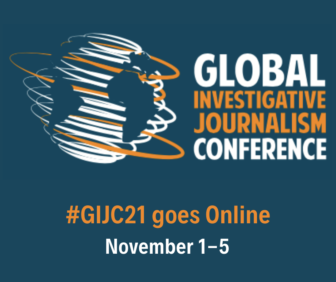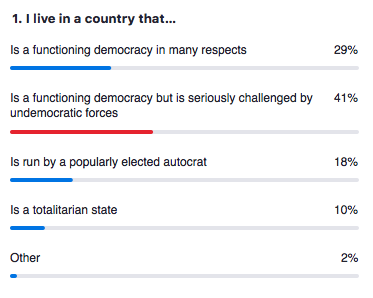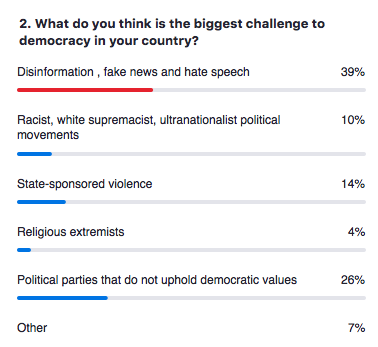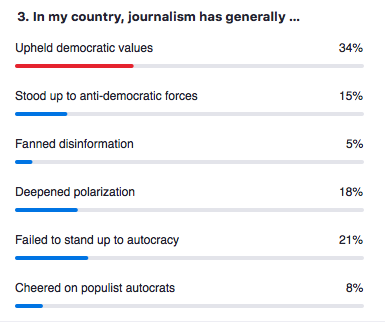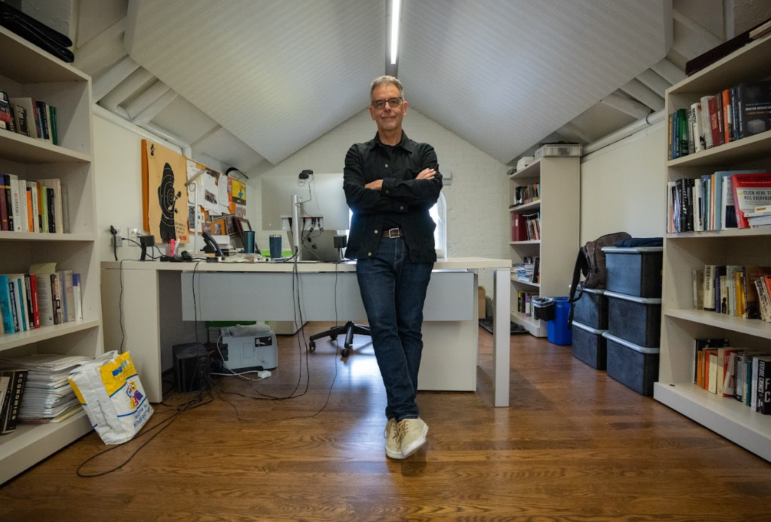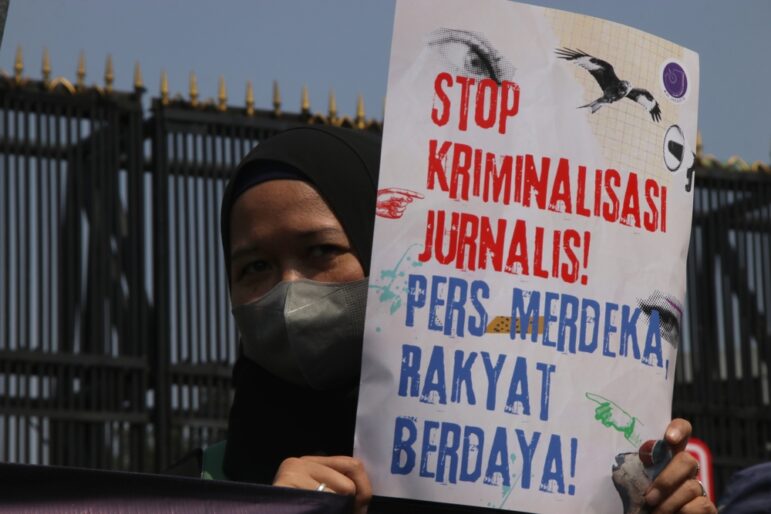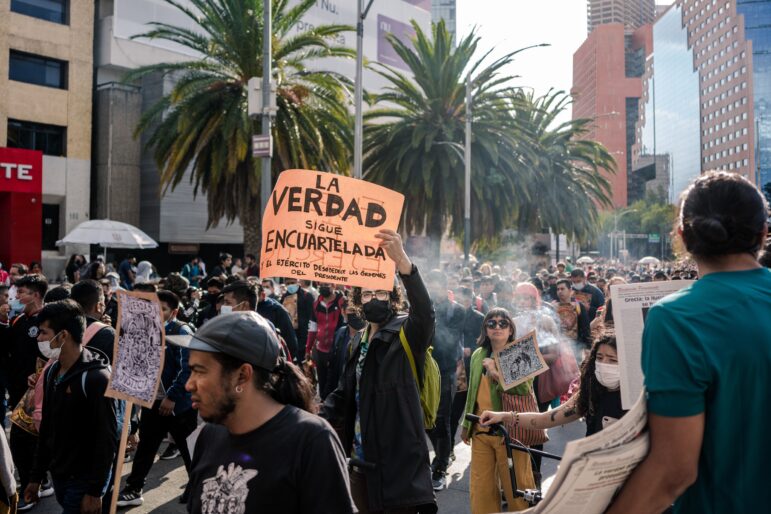

Taking the Pulse of the Global IJ Community: Democracy, Press Freedom, and Threats to Journalism
Democracies around the world are challenged by forces such as disinformation, hate speech, and a troubled journalism landscape.
This is according to a poll conducted among attendees of the 12th Global Investigative Journalism Conference (#GIJC21) plenary session, moderated by Sheila Coronel, a professor of the Graduate School of Journalism of Columbia University and the director of the Stabile Center for Investigative Journalism.
Since the GIJC draws a global audience, Coronel used the conference’s opening panel to ask editors, reporters, and civil society activists about the challenges facing democracy in their own countries, and about the role of the media in countering autocracy.
The plenary session was attended by some 500 people from 100 countries; 355 of them — about 70% — answered the poll’s three multiple-choice questions, which were:
I live in a country that…
- Is a functioning democracy in many respects
- Is a functioning democracy but is seriously challenged by undemocratic forces
- Is run by a popularly elected autocrat
- Is a totalitarian state
- Other
What do you think is the biggest challenge to democracy in your country?
- Disinformation, fake news, and hate speech
- Racist, white supremacist, ultranationalist political movements
- State-sponsored violence
- Religious extremists
- Political parties that do not uphold democratic values
- Other
In my country, journalism has generally…
- Upheld democratic values
- Stood up to anti-democratic forces
- Fanned disinformation
- Deepened polarization
- Failed to stand up to autocracy
- Cheered on populist autocrats.
Mostly Functioning Democracies, Yet…
More than two-thirds of those answering the poll said they live in a democracy (70%), while 18% believe their country is run by an autocrat, and 10% said they live in a totalitarian state (10%). The remaining 2% (attendees from Indonesia, Singapore, Japan, Venezuela, Lebanon, Pakistan, and Syria/Sweden) answered “Other.”
Out of the 70% of people who live in a democracy, 28% believe it functions “in many respects,” but 41% believe their democracy is “seriously challenged by undemocratic forces.” The takeaway? Only a minority of those taking the survey say they are living in an unthreatened democracy.
Even in countries that in the past might have been considered stalwarts of democracies, journalists see new dangers rearing their heads. “Around the world democracy is facing an existential crisis, including the country where I reside, the United States,” said Coronel, warning about the ubiquity of these threats.
“The fight for us is global as much as it is local,” said Vinod K. Jose, executive director of India’s prestigious long-form magazine The Caravan. “The bad people got united in killing democracy.”
Threats to Democracy
The biggest challenges to democracy, according to the attendees polled, are disinformation, fake news, and hate speech (39%); political parties that do not uphold democratic values (26%); state-sponsored violence (14%); racist, white supremacist, ultranationalist political movements (10%); and religious extremists (4%).
One clear theme: many people connect the greatest threats to democracy with the anomalies or failings of public discourse itself. Trustworthiness of information is being trumped by hate, divisiveness, and manipulation.
“If there is only my opinion against your opinion, my identity against your identity, my party against your party, my community against your community, my religion against your religion, and so on, it will be the law of all against all,” said veteran French journalist Edwy Plenel, president and co-founder of Mediapart. “It is the responsibility of journalism to say ‘we must put the truth of verified, documented facts in the center of the public debate,'” he added.
Although a plurality cited the threat from disinformation, fake news, and hate speech, the combined threats to democracy from extremism (religious, political, nationalist, and racist) amounted to half of the responses overall.
“The only way to expose these kinds of [disinformation and fake news] sites is to be aware that they exist, and really dig up on them,” said Maria Teresa Ronderos, director and co-founder of the Latin American Center for Investigative Journalism (CLIP).
Journalism’s Successes and Failures in Countering Autocracy
The last question in the poll asked respondents if journalism had successfully countered autocracy and other threats: views on this question were split. According to the survey, nearly half of respondents believe journalism in their countries upholds democratic values (34%) and stands up to anti-democratic forces (15%); but a total of 52% believe the media fails to stand up to autocracy (21%), deepens polarization (18%), cheers on populist autocrats (8%), and fans disinformation (5%).
Some participants were alarmed by the results: “18 percent say the media has fanned polarization, and that’s a huge challenge for free media,” said a journalist from the Economic Times of India, commenting on the survey.
Others pointed to the challenges of a media landscape that has outlets working, or seen to be working, against democracy itself. “The central basis of journalism is that it is a project of democracy,” said Dapo Olorunyomi, publisher and chief executive of Nigeria’s Premium Times, a GIJN member. “Journalism being a watchdog [of democracy] has an effective clear meaning: one, that we are setting the agenda, two, that we are really holding power accountable, and most importantly, three, that then we provide aeration and space for publishing.”
Editor’s note: This was a survey conducted online during the GIJC plenary session. These results are based on 355 answers from the approximately 500 people who attended. The answers come from those who volunteered to take part so the respondents do not represent a random sample group, or the general population.






